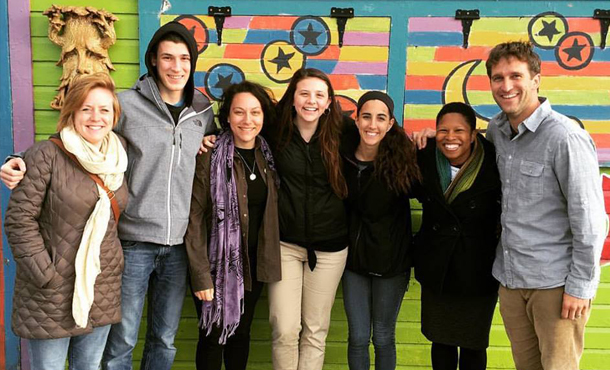At a recent conference in New York, Eastern Mennonite University students found themselves in a unique position as participant-representatives. They were the only students among the 30 participants at the “Training In Restorative Justice for College Student Misconduct and Residential Life,” held April 11-13 at Skidmore College.
Joining them were student conduct professionals, Title IX coordinators, victim/survivor advocates, as well as faculty from 14 different colleges/universities.
“I was humbled by the wisdom and different perspectives that were brought from faculty and staff from other universities to this training,” said sophomore Emma Petersheim. “It was extremely meaningful to be there as one of four students at the training because we were able to get feedback from experienced adults who have worked with students for many years as victim’s advocates.”
Hosted by Skidmore College sociology professor and Little Book author David Karp, the training included three eight-hour days of facilitation work, group engagement, and roleplaying. Karp is the author of The Little Book of Restorative Justice for Colleges and Universities: Repairing Harm and Rebuilding Trust in Response to Student Misconduct. [The Little Books of Justice and Peacebuilding series has strong ties to EMU’s Center for Justice and Peacebuilding.]
Petersheim, along with fellow sophomores Katrina Poplett and Meg Greene and first-year Noah Haglund, are currently taking a course on restorative justice (also known as RJ) and trauma awareness, taught by Professor Johonna Turner, who traveled with the group. Jonathan Swartz, restorative justice coordinator at EMU and Kelsey Kauffman, associate director at the Washington Community Scholars’ Center, also participated.
“The other colleges represented seemed to be very impressed by the engagement of the EMU students,” said Poplett. “Most of the other people there worked in the conduct offices or in administrative positions. They were all somehow related to conduct or sexual violence offenders at colleges.”
Among the skills practiced was the use of conferencing and circles to address student misconduct. Four experts from New York and Pennsylvania helped lead the training.
“My hope is that from this experience I can be a resource at EMU to help cultivate hard conversations that need to happen,” said Petersheim. “I hope to use this learning experience as a resource going forward within University Accord.”
University Accord, the campus facilitation and mediation group, has recently sponsored the creation of the student-led Team Accord. Team Accord, made up of graduate and undergraduate students, seeks to encourage education, training and facilitation of restorative justice within the EMU community. Poplett is a member of Team Accord and her three fellow students plan to join next year.
“At EMU, we talk about RJ so often that people have become cynical and make fun of it,” said Poplett. “I think it’s vital for students be educated, to get engaged in RJ, and to become facilitators. In addition, it’s very valuable to have students working with Jon [Swartz] so that it’s not just him working on restorative justice. It makes it a lot easier for him to do his job well.”
On campus, when harm is done, Swartz says that many times the initial questions are “Who did it? And what do they deserve?”
“These kinds of questions put the focus on “offenders” only, which can often silence the voices of those who were impacted,” said Swartz, who wants to “move the conversation to asking questions like ‘Who has been impacted? What will those most impacted/harmed need? How can those needs be met? Who is responsible to meet those needs? What if justice looked more like healing? What would a process to support that look like?’”
Attending such trainings helps professionals and students, those most affected by the process, see that similar questions are being asked on other university and college campuses.
Portions of this article were first published in the April 14, 2016, issue of The Weather Vane.
